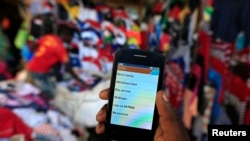In Kenya, a judge ruled Monday that a government program to install a monitoring system on mobile phone networks will remain suspended until the end of May. That is when the court will hear arguments in a case filed by an activist last month that challenges the program, alleging it is a vehicle for mass surveillance.
Kenyan media reported in February the Communications Authority of Kenya had written to the country's three top mobile service providers to request access to their computer systems in order to install a device management system.
Shortly after, Kenyan activist Omkia Omtatah filed a challenge to the system in court. He argues the device management system is an illegal violation of privacy.
The court ruled Monday it will hear his arguments and the government plan will remain suspended.
Communications Authority of Kenya official Christopher Kemei told VOA the system will only be used to detect counterfeit mobile devices.
"The system is nearly a database. It is a reference data phase which is centralized, and indeed there is no capacity to snoop," Kemei said. "It is the opposite. It is the operators that are able to query that database and confirm that the service provider, the customer, that is using their network with that particular device is a genuine device."
But critics disagree.
"The system they are seeking to install is likely to do more than that," said Henry Maina, head of the East Africa office of Article 19, a global NGO that promotes freedom of expression and information worldwide. Maina says the system can be abused.
"It is likely to snoop on people," he said. "It is likely to create different data phase which they are going to collect without consent from the consumers, and they are going to be sharing those data with other agencies, even if those sets of information are not accurate, and so there is a whole violation of the data protection principles. There is a violation of constitutional rights."
On Monday, Kenya's main opposition coalition joined the case as an interested party.
Legal experts say the Communication Authority's duty is to provide licensing for broadcast stations and programming and not to check up on whether people's Nokia or Samsung phones are real. Kenya has a counterfeit agency and a bureau of standards whose job it is to monitor consumer goods.




